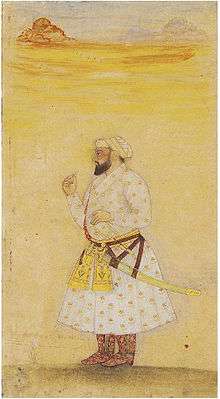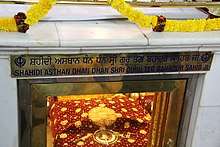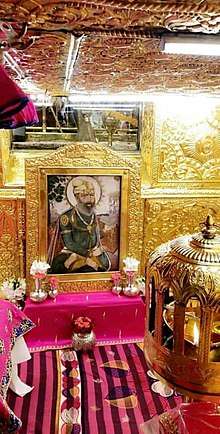
My answer is that I am a Hindu and I love Hindu dharma. How can anyone destroy it? It provides happiness both in this world as well as in the other world. There is no other religion like it. Only a deranged person or a fool would leave it to become vile. Hindu dharma would remain in the world for ever. It is not going to be destroyed by your efforts.

One who is not perturbed by misfortune, who is beyond comfort, attachment and fear, who considers gold as dust. He neither speaks ill of others nor feels elated by praise and shuns greed, attachments and arrogance. He is indifferent to ecstasy and tragedy, is not affected by honors or humiliations. He renounces expectations, greed. He is neither attached to the worldliness, nor lets senses and anger affect him. In such a person resides God.

Guru Tegh Bahadur (1 April 1621 – 24 November 1675), revered as the ninth Nanak, was the ninth of ten Gurus of the Sikh religion. Tegh Bahadur continued in the spirit of the first guru, Nanak; his 115 poetic hymns are in the text Guru Granth Sahib. Tegh Bahadur resisted the forced conversions of Kashmiri Pandits and non-Muslims to Islam, and was publicly beheaded in 1675 on the orders of Mughal emperor Aurangzeb in Delhi for refusing to convert to Islam.
Quotes
- My answer is that I am a Hindu and I love Hindu dharma. How can anyone destroy it? It provides happiness both in this world as well as in the other world. There is no other religion like it. Only a deranged person or a fool would leave it to become vile. Hindu dharma would remain in the world for ever. It is not going to be destroyed by your efforts.
- Tegh Bahadur’s Hindi reply to Aurangzeb when he was asked to become a Muslim. Kshitish Vedalankar: Storm in Punjab, p.178.
- One who is not perturbed by misfortune, who is beyond comfort, attachment and fear, who considers gold as dust. He neither speaks ill of others nor feels elated by praise and shuns greed, attachments and arrogance. He is indifferent to ecstasy and tragedy, is not affected by honors or humiliations. He renounces expectations, greed. He is neither attached to the worldliness, nor lets senses and anger affect him. In such a person resides God.
Quotes about Guru Tegh Bahadur
- This new community, the Khalsa Panth, remained an integral part of the Hindu social and religious system. It is significant that when Tegh Bahadur was summoned to Delhi, he went as a representative of the Hindus. He was executed in the year 1675. His son who succeeded him as guru later described his father’s martyrdom as in the cause of the Hindu faith, ‘to preserve their caste marks and their sacred thread did he perform the supreme sacrifice’. The guru himself looked upon his community as an integral part of the Hindu social system.
- Khushwant Singh: Many Faces, quoted from Elst, K. (2002). Who is a Hindu?: Hindu revivalist views of Animism, Buddhism, Sikhism, and other offshoots of Hinduism. New Delhi: Voice of India. Ch. 8
- [Aurangzeb] summoned the ninth Sikh Guru, Tegh Bahadur (1664-1675 A.D.), to the imperial seat at Delhi and martyred him in cold blood on his refusal to embrace Islam. Some followers of the Guru who had accompanied him were subjected to inhuman torture and torn to pieces. This was as it were a final signal that there was something very hard at the heart of Islam's heart which the Gurus had tried to soften with their teachings of humanism and universalism. Sikhism had to accept the challenge and pick up the sword in defence of its very existence.
- Swarup, Ram, & Goel, S. R. (1985). Hindu-Sikh relationship. (Introduction by S.R. Goel)
- The Sikh Gurus Tegh Bahadur, beheaded by Aurangzeb in 1675 for refusing to convert, and his son Govind Singh, who founded the military Khalsa order and whose four sons were killed by the Moghul troops, are very popular in Hindutva glorifications of national heroes'. Their pictures are routinely displayed at functions of the RSS and its affiliates, and their holidays celebrated, e.g.: 'Over 650 branches of Bharat Vikas Parishad observe Guru Tegh Bahadur Martyrdom Day'.
- Elst, Koenraad (2002). Who is a Hindu?: Hindu revivalist views of Animism, Buddhism, Sikhism, and other offshoots of Hinduism ISBN 978-8185990743 Ch. 8
- Tegh Bahadur’s martyrdom in 1675 was of course in the service of Hinduism, in that it was an act of opposing Aurangzeb’s policy of forcible conversion. An arrest warrant against him had been issued on non-religious and nonpolitical charges, and he was found out after having gone into hiding; Aurangzeb gave him a chance to escape his punishment by converting to Islam. Being a devout Muslim, Aurangzeb calculated that the conversion of this Hindu sect leader would encourage his followers to convert along with him. The Guru was tortured and beheaded when he refused the offer to accept Islam, and one of his companions was sawed in two for having said that Islam should be destroyed.
At any rate, he stood firm as a Hindu, telling Aurangzeb that he loved his Hindu Dharma and that Hindu Dharma would never die,-a statement conveniently overlooked in most neo-Sikh accounts. ... He was not a Sikh defending Hinduism, but a Hindu of the Nanakpanth defending his own Hindu religion...- Elst, Koenraad (2002). Who is a Hindu?: Hindu revivalist views of Animism, Buddhism, Sikhism, and other offshoots of Hinduism ISBN 978-8185990743
- In northern India, Gurdwara Sisgunj in Chandni Chowk, Delhi, stands witness to Aurangzeb's idea of punishment to non-Muslims. Here the Sikh Guru Tegh Bahadur was called upon to embrace Islam, and on his refusal was tortured for five days and then "beheaded on a warrant from the emperor" (December 1675).
- Lal, K. S. (1999). Theory and practice of Muslim state in India. New Delhi: Aditya Prakashan. Chapter 3
See also
External links
This article is issued from
Wikiquote.
The text is licensed under Creative
Commons - Attribution - Sharealike.
Additional terms may apply for the media files.